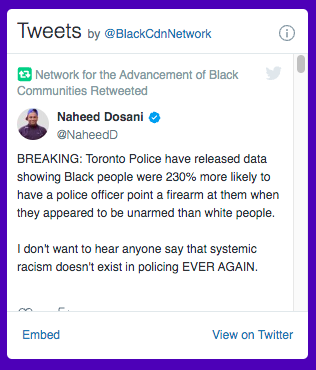Evaluation Capacity
Evaluation Capacity Building
Context
Black-led, Black-focused, and Black-serving (B3) organizations have not fared well before the pandemic hit, in terms of access to funding and capacity-building supports to adequately serve black communities. The pandemic and anti-Black racism further exacerbated their challenges to the point where many were unable to support the Black communities they served. NABC is advocating for long-term and sustained investment to strengthen B3 organizations to recover, heal, and become resilient during the recovery and post-pandemic phases. Building B3 organizations’ evaluation capacity is one way of advancing their recovery, healing, and resilience. Research and lessons learned show organizations that evaluate their work become adept at learning and become adaptive to respond better to emerging challenges and remain strong/resilient.
Evaluation Capacity Building (ECB)
NABC is working with Black evaluation practitioners, B3 organizations, and partners to test an approach to building evaluation capacity that incorporates Afrocentric perspectives. NABC is a co-designer and co-implementer, and co-learner in the pilot. Through this pilot, NABC intends to strengthen the evaluation capacity of B3 organizations. The pilot builds on lessons learned from NABC’s engagement with B3 organizations, black intermediaries, and the field of evaluation capacity building.
NABC ensures that the pilot and the evaluation capacity-building support offered:
- Fits within NABC’s learning strategy and strengthens the Black ecosystem to influence systems change
- Starts from where B3 organizations are and evaluation capacity support offered is contextualized, customized, continuous, collective, and comprehensive
- Focuses on shifting the purpose of doing and using evaluation from transactional to transformational
Preconditions for Successful Engagement
- B3 organizations are ready and committed to actively participate (access evaluation support, apply learnings to support evaluation work)
- B3 organizational leaders are ready to support their staff to conduct and use evaluation to meet accountability and learning requirements
- B3 organizational leaders are ready to promote/build evaluative culture across their organization
- B3 organizations are committed to demonstrate incremental improvement in evaluation capacity
Pilot Components
Needs Assessment
- Develop an evaluation capacity assessment tool and administer it to assess B3 organizations’ evaluation capacity needs and establish baseline data
- Analyze results and prepare a summary report
Co-design
- Co-design begins with needs assessment and engagement with Black evaluation practitioners, B3 organizations, and partners and continues throughout the implementation of the pilot to refine the approach for building the evaluation capacity of B3 organizations.
- Customize ECB supports (e.g., foundational evaluation training, technical assistance, coaching, peer learning, field building, and monitoring improvement (e.g. five progressive milestones)
- Allocate resources needed to implement and evaluate the pilot (e.g., NABC staff, a team of consultants, etc.)
ECB Pilot Offerings or Engagements
B3 Organizations
- Foundational Evaluation Training: (includes contextually and culturally sensitive evaluation training series in program and evaluation planning, designing data collection tools, data collection & analysis, and reporting delivered to clusters of B3 organizations doing similar work or serving similar populations; and access to tools/resource).
- Technical Assistance: (includes contextually and culturally sensitive technical assistance in real-time e.g., implementing evaluation, such as data collection and analysis; and reporting offered to clusters of B3 organizations doing similar work or serving similar populations).
- Coaching: (includes contextually and culturally sensitive coaching support to management and board members of 3B organizations e.g., on how to lead and support evaluation work; how to get staff buy-in; how to support/supervise evaluation work; how to encourage boards to have generative discussions; how to manage evaluation dialogue with government/funders, etc.)
- Support Peer Learning and Sharing of Best/Promising Practices: (includes creating opportunities for peer learning focused on sharing lessons learned and best/promising practices, e.g., how to embed Afrocentric values/practices in evaluation work; how to humanize evaluation; how to set the right tone for evaluation leadership, etc.)
- Linking Evaluation to Sustainability: (includes how to use evaluation data to demonstrate sustainability; how to scale up or replicate successful interventions sustainability, etc.)
Black Evaluation Practitioners
- Engage black evaluation practitioners to identify assets and learning needs
- Explore establishment of a network of black evaluation practitioners to develop a learning agenda
- Organize learning events in collaboration with black evaluation practitioners on how to embed Afro-centric values in evaluation practice (e.g., engage Chilisa, Bagele as a speaker)
Field Building
- Bring black evaluation practitioners, B3 organizations, black community leaders, and black evaluation scholars together, for high quality learning on how to create data and evaluation friendly spaces
Short-term Outcomes
- Build/enhance foundational evaluation knowledge/skills to strengthen B3 organizations’ evaluation capacity
- Support the establishment of Black Evaluation Practitioners Network to advance the work of embedding Afrocentric values in evaluation practice
- Document and disseminate knowledge/lessons learned from the pilot (i.e., Create knowledge product or write an article on key lessons learned from the pilot)
Long-term Outcomes (B3 Organizations)
Contribute towards strengthening evaluation capacity among B3 organizations measured by five progressive milestones
- Establish evaluation processes (e.g., strong program planning – clear program description and/or logic models, evaluation plans and data collection tools or other contextually and culturally relevant evaluation process).
- Implement established evaluation processes (e.g., data collection and analysis on program reach & scope, program quality, short & long-term program outcomes)
- Outcomes & Impact Reporting (e.g., meeting accountability and learning requirements by reporting program evaluation data to internal & external stakeholders)
- Knowledge Documentation & Dissemination (e.g., publishing & sharing of lessons/promising/best practices with Black Community Sector, government, funders, partners etc.)
- Linking Evaluation to Sustainability (e.g., use of evaluation data to support sustainability, resource development, long-term sustainability planning, sustainable leadership that encourages learning, secures success over time, and creates conditions for others to lead.)
Long-term Outcomes (Black Evaluation Practitioners)
- Contribute towards establishing and supporting a strong network of Black evaluation practitioners
- Contribute towards enhancing Black evaluation practitioners’ capacity to promote and embed Afro-centric values in evaluation practice
Long-term Outcomes (Field Building)
- Contribute towards building strong evaluative culture and data driven/evidence-based decision making in the black ecosystem

